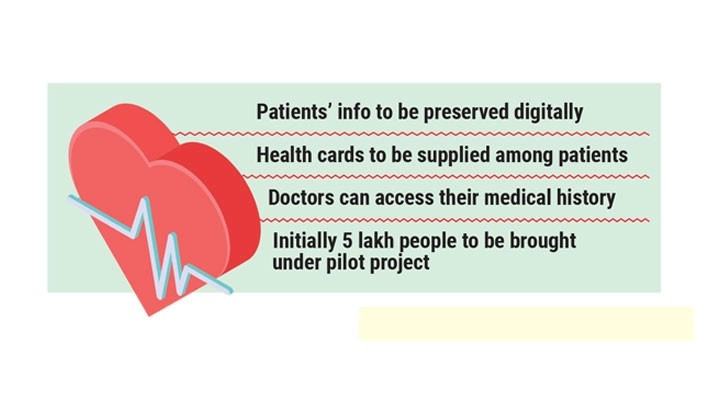
The government is going to introduce a digital healthcare system in the country with every individual having a health card with a unique identification number to ensure proper treatment for people.
The system will be launched at several public hospitals on a pilot basis from April and expanded across the country gradually.
“We’ve planned to bring the country’s people under a digital healthcare system. For this, the healthcare facilities will be automated while history of people’s health will be registered and preserved online,” Prof Dr Md Shahadat Hossain, director (Management Information System) of the Directorate General of Health Services (DGHS), told the Daily Sun.
He said every person will get a card like national identity card, containing a unique identification number where their health information like diseases, medical test reports and prescriptions of doctors will remain recorded for further needs.
“A health profile of every citizen will be made under the system which will help ensure better treatment for patients and get a better idea about the overall health situation of the country. However, it’ll take time to ensure the service across the country,” the DGHS official added.
Describing the benefits of digital health cards, he said instead of prescriptions and test reports, patients will carry health cards to hospitals allowing doctors seamless access to their medical history.
The doctors will input the digital unique ID number of the patient to software in their device – desktop or laptop – and can see the details of the patients and input the prescription.
At the same time, lab officials will also input the test reports to the digital ID number, instead of giving a printed copy.
According to the DGHS, a pilot project will be implemented first to examine the challenges, feasibility and way of a full-fledged implementation of the system across the country.
Dr Shahadat Hossain said they need two more months to start the pilot project, which will be launched at the National Institute of Traumatology & Orthopaedic Rehabilitation (NITOR) in the capital, Singair Upazila Health Complex of Manikganj and two Aalo clinics – one in Mirpur of Dhaka and another outside.
“Around 5 lakh people in those healthcare facilities will be brought under the digital healthcare system for six months. If the pilot project sees success, we’ll go for spreading the service across the country in phases,” he added.
Dr Shahadat Hossain said to implement the digital healthcare system, the government has already started automating health facilities. “Under this project, 62 hospitals – 46 upazila health complexes, 12 district hospitals and four specialised hospitals – are being brought under the automation.”
The MIS section of the DGHS is working to implement the project while digital health cards will be linked to an individual's NID or birth certificate, forming a comprehensive health profile of individuals with unique number.
The DGHS is working with the Election Commission for NID-related information and the Registrar General's office for birth registration-related information in order to create a national level database.
The health authorities have planned to bring all public hospitals under the system by 2030 and all health facilities, including private ones, by 2041.
A a central database will be created for storing and preserving health information of people under the supervision of the DGHS and this electronic data will be accessible by all hospitals and patients at any time.
Visiting automated health facilities, individuals have to show copies of their NID cards or birth certificates to get registered and get digital health cards at free of cost.
Hospitals and health organisations that are already automated will be centrally connected through a 'Shared Health Record'.
The health authorities and experts said through introduction of the digital healthcare system will improve telemedicine services, remove irregularities in healthcare facilities and ensure better services.
“However, there’re challenges in implementing the project. If the service is not introduced in all public and private facilities at the same time, it won’t be successful,” public health expert Dr Be-Nazir Ahmed, also former director (Disease Control) of the DGHS, told the Daily Sun.

